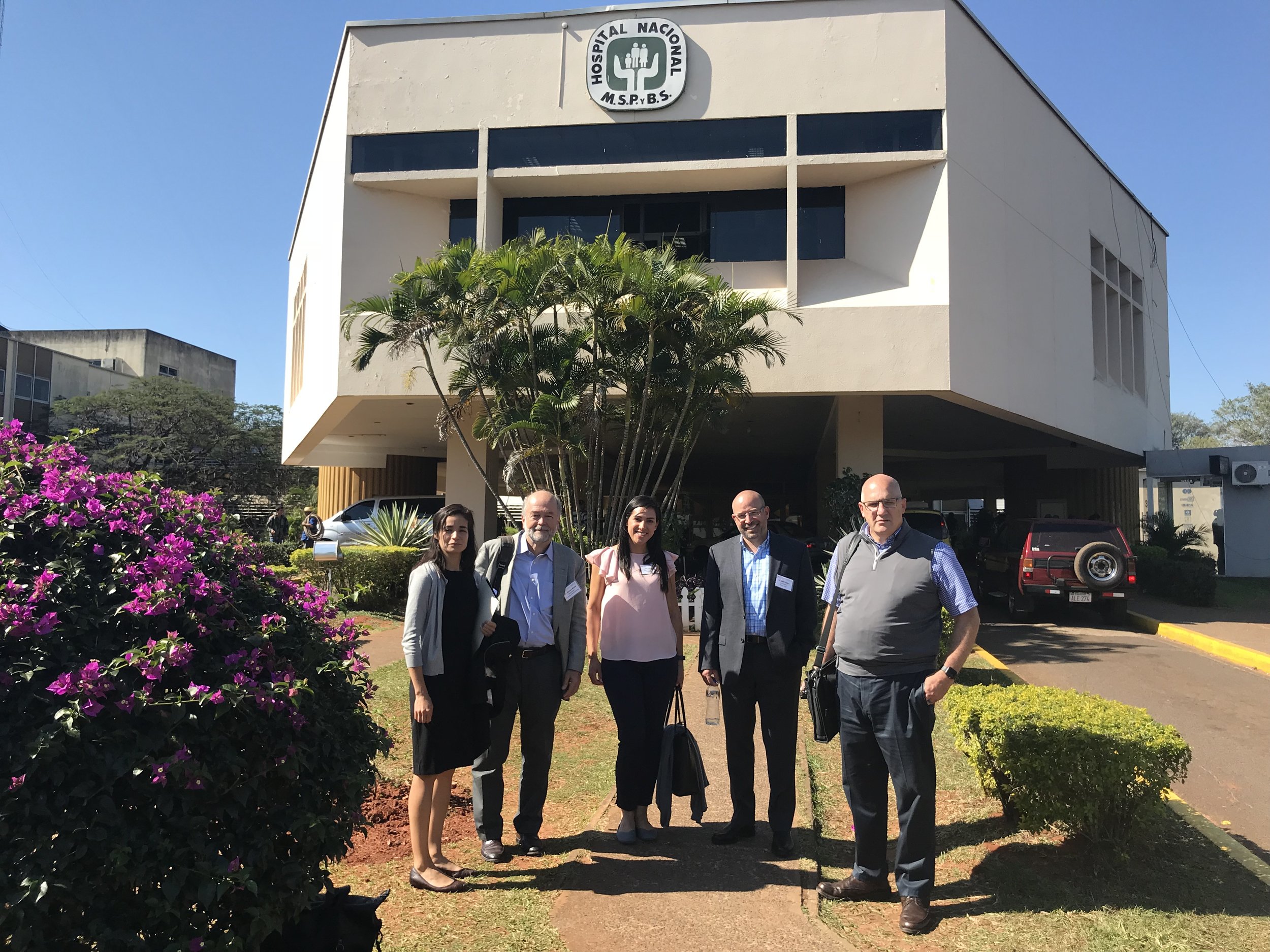We All Depend On One Another
Written by Lindsay Doucette
On Sunday, the Solidarity Bridge Neurosurgery team gathered around a table in the Paseo del Arte Hotel in Asunción, Paraguay. We were joined by Father Oscar Gonzalez from the Archdiocese of Asunción, Ricardo Gonzalez of Caritas, and Roque Acosta from the Paraguayan Bishops Conference. For the next few hours, we had the honor to listen as they shared about the history of the country and efforts of the Catholic church to support vulnerable communities in and around Asunción.
“The church welcomes you with open arms,” Father Gonzalez told us.
This was reassuring to hear. With all of the potential pitfalls in international medical mission work, words of welcome are most reassuring. Throughout the week we were welcomed, but simultaneously advised to be careful. A sobering reminder that we are stepping into a new political, cultural, and clinical context. All the more reason to begin by listening, to hear what is said and not said, and to ask lots of questions.
This particular Neurosurgery Mission Trip has been unique in that we are not serving patients. Rather, the majority of our time has been spent in meetings with key leaders and hospital personnel exploring opportunities for long-term engagement in Paraguay. Developing this local network of support is essential to making our efforts viable and impactful. We cannot do this work alone.
Our US team included three leaders from Solidarity Bridge and five neurosurgeons. On Monday, we met with Archbishop of Paraguay, Edmundo Valenzuela. We presented him with a special cross from the Archdiocese of Chicago as recognition of our connection through faith and relationship of mutual support. As Father Oscar Gonzalez said, “the Church witnesses firsthand the needs of the poor and vulnerable.” Solidarity Bridge commits to increase surgical access by supporting the public health institutions that serve those with limited resources. Meanwhile, the Catholic Church provides the infrastructure, support, and legitimacy that will help us.
We also met with the National Minister of Public Health, Dr. Julio Mazzoleni. Support from the Ministry of Public Health is important given that all of the public hospitals report directly to and are dependent on this office. We listened to his vision for improving health care for all the people of Paraguay. In this meeting we also heard more from Dr. Yolanda González, Director of the National Hospital of Itaguá, and Dr. José Kuzli, Director of the Itaguá Neurosurgery Service. We are inspired to see these doctors advocate for the needs of the Itaguá Hospital, the largest public hospital in Paraguay, and we look forward to working together to increase their surgical capacities.
On Tuesday, we traveled to Itaguá and spent time at the National Hospital. This public referral hospital sees an enormous volume of surgical cases each year. In Neurosurgery alone, there were over 1,000 surgeries in 2018, the majority of which were unplanned. The doctors we met spoke of an epidemic of motorcycle accidents in Paraguay. For this reason, there is a need for greater equipping and training to respond to neurotrauma. While Itaguá is the country’s largest public hospital, it lacks basic equipment, particularly in the area of neurosurgery.
At the National Hospital we presented a proposal for a long-term partnership to advance neurosurgical care. The heads of the hospital’s surgical and perioperative services shared their thoughts on the proposal and all seemed to welcome any efforts that would bring new resources, equipment, and training to the hospital. These hospital leaders spoke highly of their human capital resources and the commitment of their staff, but reiterated the need for support in terms of equipment and supplies.
Our team spent the following day in interviews with the directors of Nursing, Adult and Pediatric Intensive Care, Emergency, Anesthesia, Internal Medicine, Neurology, and Neurosurgery. We listened and learned much from each department, all of whom were generous with their time and expressed their gratitude for any future efforts to support their work.
These interviews have helped to identify priorities and areas where Solidarity Bridge can contribute in a meaningful way in the coming years. Our US medical team listened and saw first-hand how their Paraguayan counterparts work together to provide the best possible care for their patients. Neurosurgeon Dr. Pablo Maidana, who accompanied us throughout the day, reiterated that neurosurgical care can not improve without the simultaneous advancement of the other perioperative services. “We all depend on one another.”
I found this to be a fitting theme to our week of mission that saw diverse groups and individuals come together for the greater good. It is true, at the deepest level, that we all depend on one another. And while the future of our work here in Paraguay remains to be seen, we are encouraged to have found many promising partners who share our vision for a just, compassionate, and interdependent world, where the health needs of those most vulnerable are prioritized and medical professionals have the necessary resources to serve their communities.



